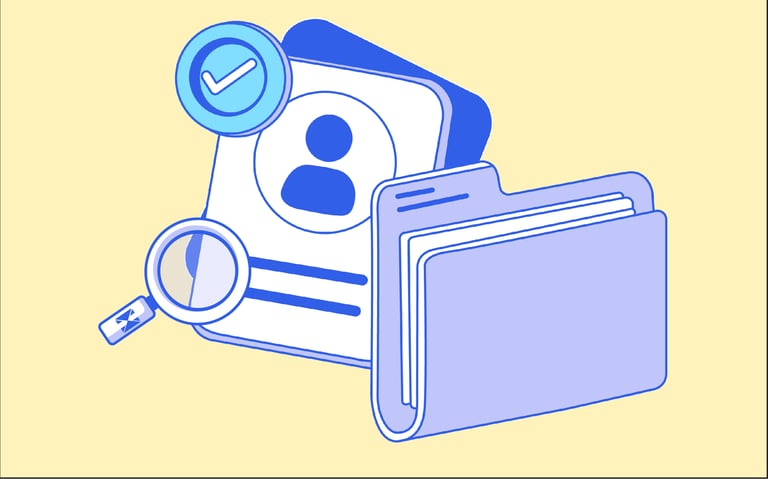KYC in Crypto: What It Is and Why It Matters
When you open an account on a crypto exchange, it’s more than just choosing a unique username and a strong password — KYC, or "Know Your Customer," is involved.
This important step, legally required and guided by organizations like the Association of Certified Anti-Money Laundering Specialists (ACAMS), helps ensure that users are legitimate. As crypto adoption grows, KYC is essential for preventing fraud and illegal activities, keeping exchanges trustworthy.
What is KYC?
KYC, or Know Your Customer is a way for financial institutions, like crypto exchanges, to check who you are and confirm you’re a legitimate user. It started in traditional banking to stop illegal activities and has become really important in the crypto world as rules have changed. While cryptocurrencies give you freedom and privacy, those can also be misused, which is why KYC is vital for keeping the industry safe and trustworthy!
Why Do Crypto Exchanges Require KYC?
Regulatory Compliance : Adhering to Anti-Money Laundering (AML) and Counter-Terrorism Financing (CTF) regulations prevents associations with illegal activities.
Enhanced Security : User verification reduces hacking risks, linking transactions to real individuals to protect funds.
Trust Building : Vetting all users fosters confidence in the exchange and trading partners.
Accountability : Quick identification of users helps address suspicious activity.
Attracting Investors : KYC compliance attracts larger financial institutions, promoting more investment in the crypto space.
Common Misconceptions About KYC in Crypto
KYC is a Hassle : Think KYC is a long and complicated process? Most exchanges have streamlined it for a quick and easy verification experience.
Loss of Anonymity : KYC doesn’t mean you lose your anonymity. Exchanges can trace transactions back to you, but your personal identity remains secure from public view.
Data Privacy Concerns : Worried that exchanges sell your data? Trustworthy platforms comply with strict privacy regulations, protecting your personal information from unauthorized sharing. Always check an exchange’s privacy policies!
Read Hata’s Privacy Policy here.
Key Documents Needed for KYC Verification
To complete the KYC process, you'll typically need:
Identification :
Driver’s License or Passport
Social Security Number
PAN Card
Voter ID Card
Address Verification : A utility bill, bank statement, or lease agreement to confirm your address.
Biometric Verification : Many platforms require a selfie, which may include:
A selfie with your ID
A live photo for facial recognition
Additional Info : Some exchanges may ask for proof of income, summarizing your income source.
Banks will periodically request KYC updates and monitor your transactions to ensure compliance with expected behaviors.
It takes less than 5 minutes to get KYC-ed at Hata!
- A Step-by-Step Guide
Login to your Hata account. You will be prompted to complete identity verification before you can proceed.
Choose to complete verification on your computer or mobile (recommended for better photo quality).
Prepare your ID card/NRIC (Malaysians) or passport (non-Malaysians) for a verification check.
Take a picture of your ID following the verification check steps.
Complete a biometric verification by following the liveliness check guide.
Depending on the status of your account, additional documents may be required: source of wealth, proof of address, and source of funds.
Read more here.
Crypto’s reputation has taken a hit due to its use in shady activities, so following compliance rules helps keep things clean. While it can feel time-consuming, compliance is key! Just make sure any platform you use has solid security in place before handing over your personal info.
DISCLAIMER & WARNING
The information provided here is presented "as is'' and is intended for general informational and educational purposes only. It does not come with any representation or warranty of any kind. This content should not be interpreted as financial, legal, or other professional advice, and it is not intended to endorse or recommend the purchase of any specific product or service. It is advisable to consult with appropriate professional advisors for personalised guidance. In cases where the article is contributed by a third-party author, please note that the expressed views belong to the author alone and may not necessarily reflect the opinions of Hata. For furthedetails, we encourage you to read our complete disclaimer. Please be aware that the prices of digital assets can be highly volatile. The value of your investment may increase or decrease, and there is a risk that you may not recover the full amount invested. You are solely responsible for making your own investment decisions, and Hata cannot be held liable for any losses you may incur. This material is not to be construed as financial, legal, or other professional advice. For more information, please refer to Hata’s Terms of Use and Risk Warning.


